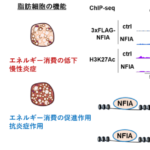2023-07-26 イリノイ大学アーバナ・シャンペーン校
◆ミールワームは高品質で消化吸収されやすいタンパク質源であり、環境にも優しいことがわかりました。ミールワーム由来のタンパク質は、肥満マウスの体重増加を抑制し、血液中のコレステロールバランスを改善することで、環境に優しいタンパク質源としての可能性が示唆されています。
◆ただし、ミールワーム由来のタンパク質は現在FDAに承認されていないため、一般的に食べられるようになるまでには時間がかかるかもしれません。
<関連情報>
- https://aces.illinois.edu/news/study-insect-protein-slows-weight-gain-boosts-health-status-obese-mice
- https://www.sciencedirect.com/science/article/abs/pii/S0022316623724206
イエローミールワーム(Tenebrio molitor)とレッサーミールワーム(Alphitobius diaperinus)のタンパク質が食事誘発性肥満マウスの体重増加を遅らせ、代謝を改善した Yellow Mealworm (Tenebrio molitor) and Lesser Mealworm (Alphitobius diaperinus) Proteins Slowed Weight Gain and Improved Metabolism of Diet-Induced Obesity Mice
Yifei Kang, Catherine C. Applegate, Fei He, Patricia M. Oba, Miranda D. Vieson, Lorena Sánchez-Sánchez, Kelly S. Swanson
The Journal of Nutrition Available online: 16 June 2023
DOI:https://doi.org/10.1016/j.tjnut.2023.06.014
Abstract
Background
High-protein diets not only meet amino acid needs but also modulate satiety and energy metabolism. Insect-based proteins are sustainable, high-quality proteins. Mealworms have been studied, but limited information is known about their ability to impact metabolism and obesity.
Objective
We determined the effects of defatted yellow mealworm (Tenebrio molitor)- and whole lesser mealworm (Alphitobius diaperinus)–based proteins on the body weight (BW), serum metabolites, and liver and adipose tissue (AT) histology and gene expression of diet-induced obesity mice.
Methods
Male C57BL/6J mice were fed a high-fat diet (HFD; 46% kcal) to induce obesity and metabolic syndrome. Obese mice were then assigned to treatments (n = 10/group) and fed for 8 wk: HFD: HFD with casein protein; B50: HFD with 50% protein from whole lesser mealworm; B100: HFD with 100% protein from whole lesser mealworm; Y50: HFD with 50% protein from defatted yellow mealworm; Y100: HFD with 100% protein from defatted yellow mealworm. Lean mice (n = 10) fed a low-fat-diet (LFD; 10% kcal) were included. Longitudinal food intake, BW, body composition, and glucose response were measured. At time of killing, serum metabolites, tissue histopathology and gene expression, and hepatic triglycerides were analyzed.
Results
After 8 wk, HFD, B50, and B100 had greater (P < 0.05) weight gain than LFD, whereas Y50 and Y100 did not. Y50, B100, and Y100 had a lower (P < 0.05) BW change rate than HFD. Mealworm-based diets led to increased (P < 0.05) serum high-density lipoprotein (HDL) and reduced (P < 0.05) serum low-density lipoprotein (LDL) concentrations and reduced (P<0.05) LDL/HDL ratio. Mealworm-based diets led to increased (P < 0.05) hepatic expression of genes related to energy balance, immune response, and antioxidants and reduced (P < 0.05) AT expression of genes associated with inflammation and apoptosis. Mealworm-based diets altered (P < 0.05) hepatic and AT expression of glucose and lipid metabolism genes.
Conclusions
In addition to serving as an alternative protein source, mealworms may confer health benefits to obese patients.



